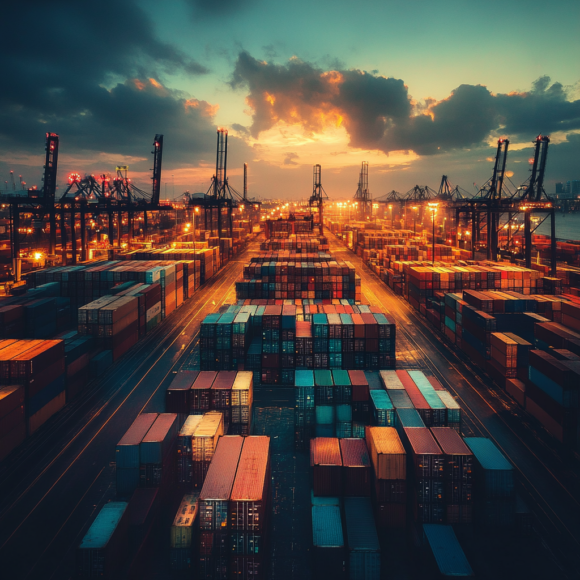Insurance industry analysts, economists, and trade associations have continued to look at the potential effect of President Trump’s tariffs.
About a month after Trump looked to impose steep tariffs on China, Mexico, and Canada, the administration on April 2 applied at least a 10% tariff on all exporters to the U.S.—with dozens of countries seeing higher, in some cases much higher, tariffs. Plus, a 25% tariff applies to all imported cars and parts.
The stock market has since been in turmoil as investors deal with rumor, hear from business leaders, and try to figure out the ultimate effect.
The industry in March reacted to Trump’s tariffs on China, Mexico, and Canada by saying they would negatively affect the insurance industry—particularly U.S. homeowners and auto insurance. American Property Casualty Insurance Association (APCIA) CEO David A. Sampson said at the time that the trade association recognized tariffs as “effective tools of government” but added that the tariffs are “so broad that they are likely to hurt families, individuals, and business owners they are meant to protect.”
When reached for comment on the broader levies announced on “Liberation Day” April 2, APCIA said consumers could see an impact to their insurance bill in 12 to 18 months, and that the organization has estimated an annual rise in personal auto insurance claims costs of between $30 billion and $60 billion.
“Given insurers’ expenses beyond the direct cost of claims, the total premium impact will likely be higher,” APCIA said via bullet-point notes sent to Insurance Journal. “As the estimates are based on insurance data, given the number of uninsured motorists, or those that do not carry collision or comprehensive coverage for property damage to their own vehicle, the total impact on consumers is expected to be even higher.”
In a post on LinkedIn, Sampson said APCIA “has been informing federal policymakers about the potential impact of tariffs.”
Commercial auto claim costs are also expected to be impacted. APCIA also called out construction insurance because materials such as steel and lumber are expected to increase, but much of its initial focus was on auto—with about a third of insurance industry’s total premium.
Citing Wall Street analysts, APCIA said the price for new cars would increase $4,000 to $15,000. About 60% of auto replacement parts come from Mexico, Canada, or China, and repairs will take longer if the supply doesn’t come from other countries.
Michel Leonard, economist for the Insurance Information Institute (Triple-I), said economic dislocation such as in open trade “would have the most significant impact on underlying growth and replacement costs for personal auto and homeowners insurance.”
Leonard said the impact on the price of goods is more a “function of inventory levels, ease of substitution, and margins along the product value chain” than the size of the tariffs.
“In the short term, changing trade dynamics between countries can impact the availability and price of goods key to the insurance industry,” such as farm equipment, furniture, construction materials, and EV batteries, Leonard added. He also mentioned an impact on losses to other lines of insurance such as surety, trade credit, business interruption, and political risk.
Economist Robert Hartwig, professor of finance and director of the Center for Risk and Uncertainty Management at the University of South Carolina, said that apart from the tariff’s affect on auto and home insurance, “Trump’s disdain for global trade” directly threatens other lines of business such as ocean marine, inland marine, aviation, and trade credit.
“The time has come for insurance and reinsurance CEOs to join a growing chorus of industry executives to make very clear to the Trump administration and Republicans in Congress that we are on a collision course for recession, potentially global in scale, and that a major course correction is required—and very soon,” Hartwig added, citing recent comments made by Wall Street heavy-hitters such as JP Morgan Chase CEO Jamie Dimon and billionaire investor Bill Ackman of Pershing Square.
AM Best’s Mahesh Mistry, senior director of analytics, said insurance companies “should be looking at hypothetical ‘what-if’ scenarios” and that the agency has yet to see any major shift in investment or underwriting strategy.
“The indirect impact of the tariffs may be more meaningful,” continued Mistry. “The general costs of commodities will likely have a knock-on effect on insurance premiums. More imminent would be whether the tariffs create any inflationary pressures on certain products. The consequence of the tariffs could translate into wider economic impacts for certain countries, affecting growth, affordability, cost of living, which can have further knock-on effects.”
Mistry said market volatility and financial distress to business could surface in decrease demand for insurance, and claims in D&O liability and trade credit insurance.
In his post to LinkedIn, APCIA’s Sampson worried about the broader impact to U.S. relations to other countries.
“Even if tariffs are reversed quickly—though that seems unlikely—it could reinforce the growing perception of the U.S. as an unreliable or self-interested actor,” he said.
Was this article valuable?
Here are more articles you may enjoy.


 Elon Musk Alone Can’t Explain Tesla’s Owner Exodus
Elon Musk Alone Can’t Explain Tesla’s Owner Exodus  Founder of Auto Parts Maker Charged With Fraud That Wiped Out Billions
Founder of Auto Parts Maker Charged With Fraud That Wiped Out Billions  Uber Jury Awards $8.5 Million Damages in Sexual Assault Case
Uber Jury Awards $8.5 Million Damages in Sexual Assault Case  Hackers Hit Sensitive Targets in 37 Nations in Spying Plot
Hackers Hit Sensitive Targets in 37 Nations in Spying Plot 